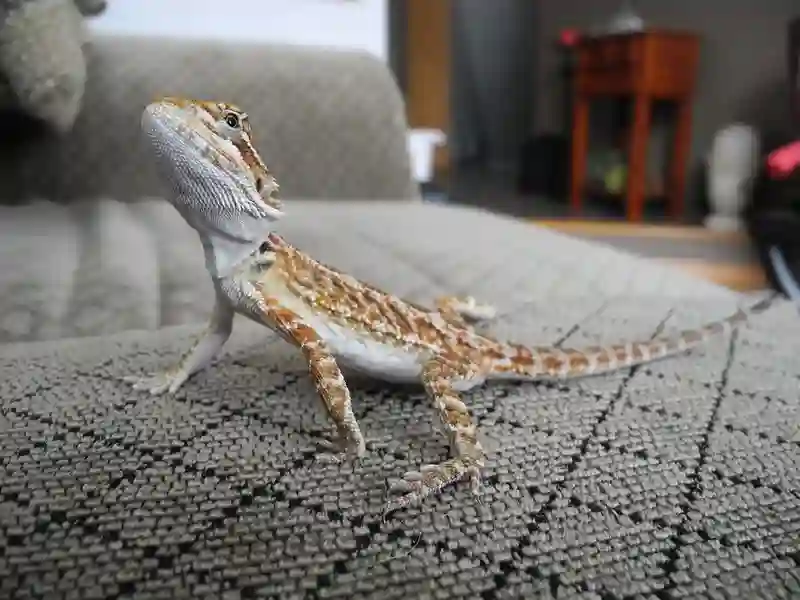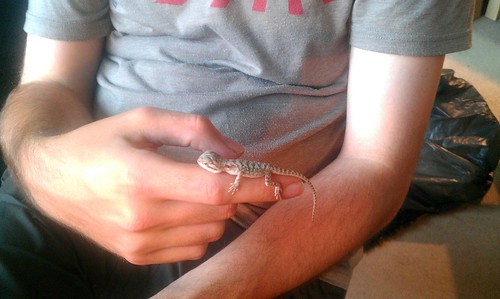A 3-month-old bearded dragon can weigh between 20 and 110 grams. Here is a summary of the weight ranges for bearded dragons at various stages:
- Hatchlings (0-2 months): 4-6 grams, reaching up to 20 grams by 3 months.
- Babies (1-3 months): 4-20 grams.
- Juveniles (3-11 months): 20-400 grams.
- Adults (12-18 months): 400-550 grams.
It’s important to note that every dragon is different, and if you notice your dragon is measuring significantly outside of these ranges, you should consult with a veterinarian to ensure they are healthy.
The typical weight range for a 3-month-old bearded dragon
The typical weight range for a 3-month-old bearded dragon varies depending on various factors such as genetics, diet, environment, among others. A healthy 3-month-old bearded dragon should weigh between 90-180 grams (or 0.2-0.4 lbs).
However, it’s important to remember that each individual bearded dragon may vary slightly in size and weight — some may grow more quickly or slowly than others. Regularly monitoring your pet’s weight will help you determine if they are growing at a healthy rate or if there may be health concerns to address.
Monitoring Bearded Dragon Weight
There are a few reasons why monitoring the weight of your bearded dragon is important. First and foremost, it can be an indication of their overall health status.
Fluctuations in weight can signify an underlying health issue or simply indicate that dietary or environmental changes need to be made. Additionally, tracking your pet’s weight over time can help you determine whether they are growing at a healthy rate.
The Importance of Regular Weighing
It’s recommended that bearded dragons be weighed regularly in order to catch any changes in weight early on. This is especially important for juvenile dragons who are still growing rapidly. By weighing your pet regularly, you can quickly identify any potential issues and take action before the situation worsens.
Recommended Frequency for Weighing
So how often should you weigh your 3-month-old bearded dragon? It’s generally recommended that juveniles be weighed at least once a week until they reach 6 months of age. After that point, weighing every other week should suffice unless there are concerns about their growth or overall health.
Tools Needed for Accurate Measurement
To accurately measure the weight of your bearded dragon, you’ll need a few tools. First and foremost, you’ll need a reliable scale capable of measuring small weights with precision (at least up to 1 gram accuracy).
Digital kitchen scales can work well for this purpose but make sure to calibrate it before use. Additionally, you’ll want to weigh your pet on a flat surface such as a cutting board or baking sheet.
Avoid using fabric surfaces as they may impact the accuracy of the measurement due to friction. Make sure to record each measurement so you can track changes over time and easily spot any trends or concerns that may arise.
Factors Affecting Bearded Dragon Weight
Diet and Nutrition
The diet and nutrition of a bearded dragon play a significant role in its weight. As omnivores, they require a balanced diet consisting of vegetables, fruits, and insects.
It is crucial to feed your bearded dragon the appropriate amount of food to prevent overfeeding or underfeeding. Overfeeding can lead to obesity, while underfeeding can result in malnourishment and stunted growth.
The ideal diet for a 3-month-old bearded dragon should consist of 80% insects and 20% vegetables and fruits. Some suitable insect options include crickets, mealworms, superworms, silkworms, and roaches.
Exercise and Activity Level
Bearded dragons require exercise to maintain their healthy weight. They should have enough space to move around freely in their enclosure.
It is recommended that you take your bearded dragon out of its cage daily for at least an hour for exercise and playtime. Lack of exercise can lead to weight gain as well as health problems such as metabolic bone disease.
Environmental Factors such as Temperature and Humidity
Environmental factors such as temperature and humidity are essential for the healthy growth of a bearded dragon. Proper temperature regulation aids digestion while maintaining optimum humidity levels prevent skin problems like shedding issues.
A suitable temperature range for a bearded dragon’s enclosure should be between 95-105°F (35-40°C) during the day with a basking spot reaching up to 110°F (43°C) while dropping down between 70-80°F (21-27°C) at night time allowing them to cool down when necessary.
Overall it is important to keep track of all these factors that affect the weight of your bearded dragon by monitoring its behavior including appetite changes, defecation, and changes in skin color.
By ensuring proper diet and nutrition, allowing enough exercise time, and maintaining the appropriate environmental factors such as temperature and humidity levels can keep your bearded dragon healthy.
Tips for Maintaining Healthy Weight in Bearded Dragons
Feeding schedule recommendations
The feeding schedule for a 3-month-old bearded dragon should include live insects such as crickets or mealworms and fresh vegetables. As they grow, they will require more protein and fewer vegetables.
Start by feeding them twice a day, providing enough food to last no more than 10-15 minutes per feeding session. Overfeeding can lead to obesity and health problems.
Nutritional requirements for a 3-month-old bearded dragon
Bearded dragons require a balanced diet to maintain their health. Protein should make up around 50% of their diet, while the other half should consist of fresh fruits and vegetables. At three months old, they require more protein than older beardies do, so feed them more insects than veggies.
Insects like crickets should be gut-loaded with fresh fruits and veggies before being fed to the bearded dragon. This will provide additional nutrients that the beardie needs to thrive.
Exercise and playtime suggestions
Bearded dragons need exercise just like humans do! Playtime outside of their enclosure is important for keeping them healthy physically and mentally. Give your beardie plenty of space to roam around in a safe environment as you supervise them.
You can also provide your beardie with toys like branches or rocks to play with inside their enclosure. Keep in mind that they need plenty of room inside their enclosure to move around freely – too small an enclosure can result in unhealthy weight gain due to lack of activity.
Maintaining healthy weight in bearded dragons requires close monitoring of their diet and exercise habits. Following these tips for feeding schedules, nutritional requirements, and exercise/playtime can help keep your bearded dragon happy and healthy!
Measuring Bearded Dragon Weight Accurately
Bearded dragons are popular pets, and proper weight management is essential for their overall health and well-being. To accurately measure your dragon’s weight, there are several important steps to follow:
Step-by-step guide on how to weigh your bearded dragon at home
- Choose the right scale: Use a kitchen or postal scale that has a capacity of at least two pounds or more.
- Tare the scale: Turn on the scale and let it calibrate to zero, then place a clean container on top of it and tare it again.
- Place your bearded dragon in the container: Gently place your dragon in the container, making sure that all its limbs are inside and not hanging out.
- Weigh your pet: Wait for the scale to give you a stable reading, then record the weight of your pet.
- Calculate net weight: If you used a container to weigh your pet, subtract its weight from the total weight displayed on the scale to get an accurate measurement of your bearded dragon’s weight.
Common mistakes to avoid when measuring weight
Accurate measurement is critical when monitoring your bearded dragon’s growth and health status. Here are some common mistakes that can compromise accuracy: – Using an inappropriate or inaccurate scale
- Not taring or zeroing out the scale before weighing.
- Placing objects inside or under the container that can add additional weight.
- Not ensuring all four legs of the dragon are positioned inside while being weighed.
By avoiding these mistakes during measurements, you can get accurate readings and ensure that any changes in size or growth rate can be detected early enough for appropriate intervention measures to be taken.
Conclusion
Throughout this article, we have discussed the importance of monitoring the weight of your 3-month-old bearded dragon and provided various tips and suggestions on how to maintain a healthy weight for your pet.
We have learned that bearded dragon growth can vary depending on several factors, including diet, exercise, and environmental conditions. Regularly monitoring your pet’s weight is critical to ensure they are growing at a healthy rate and avoiding any potential health issues.
By following the recommended feeding schedule, providing proper nutrition, and engaging in regular exercise routines with your bearded dragon, you can help maintain a healthy weight for your pet. Additionally, ensuring accurate measurements when weighing your bearded dragon is crucial to tracking progress accurately.
Owning a bearded dragon can be an incredibly rewarding experience. By keeping track of their weight regularly and implementing good nutritional habits into their diet plan while engaging in activities that promote physical activity and a healthy lifestyle for them will help ensure that your pet remains happy and healthy for years to come.



Leave a Reply